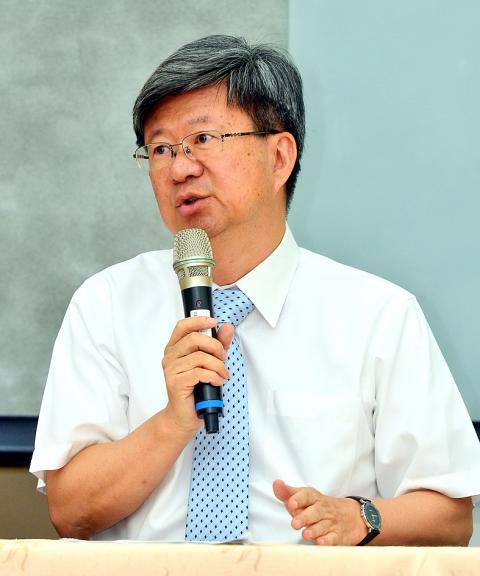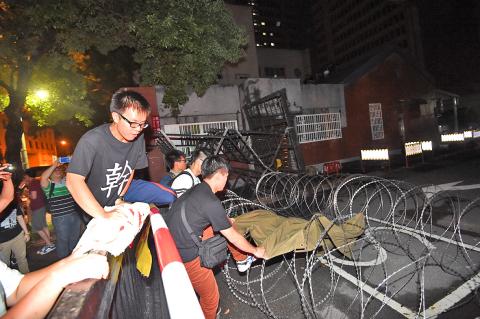Students who allegedly broke into the Ministry of Education (MOE) compound late on Thursday night — and possibly three journalists who followed the students — are to be charged with several offenses, Minister of Education Wu Se-hwa (吳思華) said yesterday, calling the students a “front” for external political forces.
Wu said that the ministry had communicated with students on numerous occasions, both official and unofficial, and had shown restraint in not prosecuting previous incidents of trespassing on ministry property.
“Our tolerance has been rewarded with continued irrational behavior, which we feel has been disorderly and seriously breaches the bounds of what is acceptable, creating the worst possible example,” Wu said, adding that he wished to express his “regret” and “condemnation” of the students’ “brashly illegal behavior.”

Photo: Taipei Times
The ministry said that 33 people had been arrested, including 24 students, three reporters and six other individuals. Eleven minors were among those arrested.
The students used ladders to scale barbed-wire barricades on the perimeter of the ministry compound, with a number of students later barricading themselves inside Wu’s office.
MOE Secretary-General Wang Chun-chuan (王俊傑) said that the students would be prosecuted for two charges according to the Criminal Code: trespassing on the dwelling or structure of another and damaging public property.

Photo: Liao Chen-huei, Taipei Times
Wu condemned what he called the “unethical behavior” of outside political forces behind the student movement.
“At many venues, we found that some political parties and social organizations have interposed themselves in activities relating to the curriculum guidelines,” Wu said. “They hide themselves behind students who are pushed to the front lines.”
Wu also ruled out any temporary suspension of the controversial curriculum guidelines, stating that the administrative procedures for them to go into effect next month have already been completed and he could not reverse them.
He said the ministry maintains that schools are to be allowed to use textbooks based on either the old or new versions of guidelines, with teachers using “supplementary materials” to lead discussion on both sides of the controversial portions.
Regarding communication with students, Wu said that students protesting earlier this week had failed to clearly state how they wished to communicate with ministry officials.
While schedule conflicts prevented him from attending Thursday’s ministry-sponsored forums on the guidelines, the officials who did attend were fully capable of representing the ministry’s position, he said.
Forums were delayed for more than a month after the first event ended with Wu being confronted by students, who attempted to prevent him from leaving.
Wu said he remained willing to meet with student representatives, with the time, place and manner of such a meeting all negotiable.
He confirmed that Wu Ching-shan (吳清山) had tendered his resignation as director of the K-12 Education Administration, which is responsible for implementing the guidelines, but said that he had yet to approve the request.

US President Donald Trump yesterday announced sweeping "reciprocal tariffs" on US trading partners, including a 32 percent tax on goods from Taiwan that is set to take effect on Wednesday. At a Rose Garden event, Trump declared a 10 percent baseline tax on imports from all countries, with the White House saying it would take effect on Saturday. Countries with larger trade surpluses with the US would face higher duties beginning on Wednesday, including Taiwan (32 percent), China (34 percent), Japan (24 percent), South Korea (25 percent), Vietnam (46 percent) and Thailand (36 percent). Canada and Mexico, the two largest US trading

AIR SUPPORT: The Ministry of National Defense thanked the US for the delivery, adding that it was an indicator of the White House’s commitment to the Taiwan Relations Act Deputy Minister of National Defense Po Horng-huei (柏鴻輝) and Representative to the US Alexander Yui on Friday attended a delivery ceremony for the first of Taiwan’s long-awaited 66 F-16C/D Block 70 jets at a Lockheed Martin Corp factory in Greenville, South Carolina. “We are so proud to be the global home of the F-16 and to support Taiwan’s air defense capabilities,” US Representative William Timmons wrote on X, alongside a photograph of Taiwanese and US officials at the event. The F-16C/D Block 70 jets Taiwan ordered have the same capabilities as aircraft that had been upgraded to F-16Vs. The batch of Lockheed Martin

GRIDLOCK: The National Fire Agency’s Special Search and Rescue team is on standby to travel to the countries to help out with the rescue effort A powerful earthquake rocked Myanmar and neighboring Thailand yesterday, killing at least three people in Bangkok and burying dozens when a high-rise building under construction collapsed. Footage shared on social media from Myanmar’s second-largest city showed widespread destruction, raising fears that many were trapped under the rubble or killed. The magnitude 7.7 earthquake, with an epicenter near Mandalay in Myanmar, struck at midday and was followed by a strong magnitude 6.4 aftershock. The extent of death, injury and destruction — especially in Myanmar, which is embroiled in a civil war and where information is tightly controlled at the best of times —

China's military today said it began joint army, navy and rocket force exercises around Taiwan to "serve as a stern warning and powerful deterrent against Taiwanese independence," calling President William Lai (賴清德) a "parasite." The exercises come after Lai called Beijing a "foreign hostile force" last month. More than 10 Chinese military ships approached close to Taiwan's 24 nautical mile (44.4km) contiguous zone this morning and Taiwan sent its own warships to respond, two senior Taiwanese officials said. Taiwan has not yet detected any live fire by the Chinese military so far, one of the officials said. The drills took place after US Secretary